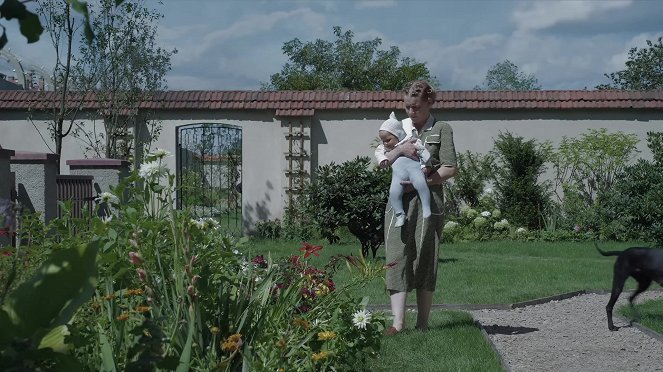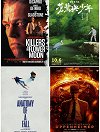Regie:
Jonathan GlazerDrehbuch:
Jonathan GlazerKamera:
Łukasz ŻalMusik:
Mica LeviBesetzung:
Sandra Hüller, Christian Friedel, Ralph Herforth, Freya Kreutzkam, Max Beck, Ralf Zillmann, Imogen Kogge, Stephanie Petrowitz, Marie Rosa Tietjen (mehr)Streaming (1)
Inhalte(1)
Regisseur und Drehbuchautor Jonathan Glazer ließ sich für den Film von dem gleichnamigen Buch des verstorbenen Autoren Martin Amis inspirieren. Sein in deutscher Sprache gedrehter Film beleuchtet die Schrecken des Holocaust aus der Perspektive von Rudolf und Hedwig Höß, dem Kommandanten von Auschwitz und seiner Familie, die in ihrem Bilderbuchheim Mauer an Mauer mit dem Vernichtungslager ein äußerst privilegiertes Leben führen. (Leonine)
(mehr)Kritiken (10)
Jonathan Glazer und wieder sein starker Autoren- sowie Arthouse-Charakter. In seinem Film sieht man weder die Häftlinge in Auschwitz noch die Gräueltaten hinter den Mauern des KZs. Das minimalistisch inszenierte, aber effektvoll arrangierte Geschehen spielt sich in der Villa der Familie Höss und in ihrem Garten ab. Der Garten ist von einer Mauer umgeben, über der Mauer sieht man die Gipfel der Baracken im KZ. Höss geht zur „Arbeit“, so wie es sich gehört. Seine Freizeit verbringt er mit der Familie. Frau Höss liebt die Blumen im Garten. Ihre Kinder spielen am Pool. Manchmal bekommt Höss Besuch, der mit seiner Arbeit zusammenhängt, z. B. Ingenieure mit einem Projekt eines effizienteren Verbrennungsofens. Manchmal bringt jemand einen Sack mit schöner Kleidung, die sie sich nehmen können… Die ganze Zeit hört man aus der Ferne das Geräusch der Fabrik-Maschinerie des Todes, manchmal das Geschrei von Menschen, bellende Hunde, Schüsse. Am Himmel sind schwarze Wolken aus Asche zu sehen. In kleinen Nuancen hat man sich auch damit befasst, wie die Kinder von Höss die Welt außerhalb des Hauses wahrnehmen. Die Träume des Mädchens in inversen Schwarzweißbildern sind das wirkungsvollste künstlerische Ornament. Der Film ist voll von solchen Elementen, was dazu führt, dass das Festival-Publikum maximal zufrieden ist. Die Szene mit Höss auf der Treppe mit den dunklen und leeren Gängen ist genial. Für mich war es der Höhepunkt des Filmes. Eine andere Perspektive vom Holocaust, mit der unangenehmsten Musik im Abspann, die Sie je erlebt haben. Jonathan Glazer gehört hiermit zu den Meistern wie Michael Haneke und Giorgos Lanthimos. [Cannes FF]
()
Such is the daily routine of a family of ordinary, decent citizens. They grow kohlrabi and carnations in the garden, keep the house in perfect order, pet the dog and frolic in the swimming pool, and all this is provided by the head of the family, who goes to work every day in an exemplary manner and who - by the way - is the director of the most monstrous concentration camp. He is, again by the way, at work dealing with, for example, the more efficient incineration of Jews in ovens, and does it with the same emotional involvement as when you and your wife are deciding what to buy for dinner at the supermarket. And behind the walls of this middle-class family's property, behind those ominous walls, is a human-scale Mordor where the most monstrous acts against humanity are taking place, and you feel an immense oppression thanks to the ingenious sound work and the ominous visual details in the distance, such as the smoke from the ovens, or from the locomotives bringing in more and more human fuel. The film doesn't shove down your throat horrific imagery about how monstrous the Holocaust is, it does it on a subliminal basis, working with your subconscious, and that actually makes it all the worse. It made me sick, but at the same time I bow down to Jonathan Glazer for this bold cinematic experiment that says more about us humans than you'd expect.
()
Though throughout most of the film we don’t see anything other than an outwardly ordinary German family, the layered soundtrack, which mixes the chirping of birds and the murmur of a river with a constant mechanical drone, evokes an almost indefinable feeling from the first minutes, a feeling that something intimately familiar seems strange and oppressive. The resulting effect is best described by the term “unheimlich” from Freud’s psychoanalysis, i.e. uncanny. Zone of Interest is extremely disturbing in its ability to capture the abnormality of the everyday. ___ The unchanging, rigid apathy of the depicted world is underscored by predominantly static shots without artificial lighting and with great depth of field. The cameras are positioned in different corners of the house and garden like in a reality TV show. They record the movements of the actors without artistic stylisation, thus evoking an impression of the distant past. Not even the editing adheres to the principles of standard narrative cinema. The switching between cameras depends on which room a character has just entered. Everything thus seemingly takes place in the present tense. Subjectivity and creativity, or rather the possibility of averting one’s gaze and disrupting the order of things, are suppressed. The tasks that Höss carries out are mindless administrative work. Genocide is a logistical process. ___ If we wanted to locate the source of the tension that pervades the whole film, it would be the clash between what the Hösses are willing to see and what happens outside of their house and garden. Glazer’s distinct style is a form of rejection. He consistently avoids aestheticizing one of the greatest tragedies of modern history. At the same time, he succeeds in using empty space in a way that is far more powerful than direct depiction. Because we cannot see the other side, we are aware of what is happening there. Our effort to fill this gap leads to the fact that we cannot stop thinking about the ongoing violence. ___ Glazer also included night scenes shot with a special thermal camera. This involves a reconstruction of the story of a ninety-year-old Polish woman named Alexandra, whom Glazer met during his research. She became for him a symbol of resistance, a light in the darkness. Taking into account the perspective of those who actively resisted Nazism is one of the few elements that Zone of Interest shares with more conventional dramas about the Holocaust. Where other Oscar-winning dramas offer catharsis and a reassurance that humanity will ultimately prevail, Zone of Interest offers only a disturbing presentiment of things to come. We see that the concentration camp has become a museum where cleaners mechanically vacuum the dust and polish the display cases. A single glance inside the death factory peculiarly does not reveal any atrocities. Rather, it is characterised by the same emotionless routine that we saw in the Hösses’ bourgeois household. We have become accustomed to the presence of the Holocaust in our collective memory and in the media space. Zone of Interest shines a light on the mundanity, banality and elusiveness of the evil to which we contribute merely by remaining indifferent. 90%
()
(weniger)
(mehr)
I have a bit of a complicated relationship with director Jonathan Glazer. I like some of his films a lot, others practically not at all, and I'm glad Zone of Interest falls into the former group. I'm also happy that it ended up looking a little different than I expected. Glazer's Holocaust drama is very much built on working with sounds, but mostly with the viewers and their knowledge. You have to know what family you're looking at all the time, who Rudolf Höss was and what atrocities he committed. Zone of Interest doesn't explain anything, you could say that we learn practically nothing about the protagonists, because there's no need to, and Glazer is counting on you paying attention in history class, or at least reading the synopsis before entering the cinema. This allows him to focus solely on establishing atmosphere, combining hints of the horrors happening behind the walls of the family home while showing the ordinary little Nazi domestic bliss of the Hösses and their children. They come across as extremely ordinary, and that they are cynics and human monsters is something you have to surmise from their actions, as they balefully ignore the hell they themselves have unleashed or are willingly profiting from. Perhaps my only complaint is that I would have expected Zone of Interest to make it a little harder (like, say, the new Scorsese) and more uncomfortable for me as a viewer. On the other hand, Glazer's attempt to merely chronicle the family life of two monsters who tend a greenhouse, organize family get-togethers in the garden, and invite a loving mother to their home, only to occasionally subtly remind us who we're actually dealing with, works well too. An original and compelling drama capable of being very uncomfortable at the right moments.
()
Szenen aus dem nationalsozialistischen Eheleben und ein Film, dessen Konzept so straff ist, dass es mich seltsam gleichgültig zurückgelassen hat. Die Idee, die Todesfabrik in eine 2D-Kulisse zu verwandeln, welche die Kamera von Łukasz Żal durch die Tiefe des Feldes buchstäblich an den „Paradiesgarten“ der Familie Höss drückt, ist erstickend, beklemmend, aber auch monoton. Es droht, dass sich der Zuschauer daran gewöhnt, so ähnlich wie die Figuren an den allgegenwärtigen Gestank, die Schreie und das Stöhnen. Das zentrale Duo kann nicht genug vermenschlicht werden, um einen psychologischen Gegenpunkt zu den vermuteten Schrecken des Holocausts zu bilden. In den Routinen der Familie Höss war etwas Mechanisches, das es mir erleichterte, mich von der Dringlichkeit der Welt von Glazer zu entfernen. Die Banalität des Bösen ist präzise und wörtlich illustriert. Ich erinnerte mich an den ähnlich konzipierten und distanzierten Film Michael von Markus Schleinzer, der jedoch wirklich beeindruckend wird, wenn die Figur des pädophilen Gewalttäters einen Gegner in Form seines Opfers erhält, eine starke Gegenperspektive. Am Ende wählt Glazer ein ähnliches Prinzip, aber er zerstört die vierte Wand auf eine Art und Weise, die mehr intellektuellen Kalkül als natürliche Kraft in sich hat. War sich Höss der moralischen Dimension seiner Taten bewusst oder konnte er sie in der Rhetorik industrieller Produktion und historischer Notwendigkeit verstecken? Hier liegt die Grenze der Möglichkeiten von Glazers Film. The Zone of Interest ist in der Fülle des „Holocaust-Pornos“ ein Film, der durch seine Andersartigkeit und den Mut wichtig ist, die Perspektive zu ändern, dem Zuschauer die Erfahrung einer „kognitiven Dissonanz“ zu vermitteln, die die direkten Akteure des Bösen erfahren. Es ist auch eine interessante Reflexion des zentralen ideologischen Begriffs „Lebensraum“, der in der Darstellung von Frau Höss die Form eines ordentlichen Gartens annimmt, der mit der Asche der Toten gedüngt wird. Ich persönlich finde es jedoch viel interessanter, den Film aus der Ferne zu reflektieren, als ihn direkt auf der Leinwand zu erleben. In dieser Hinsicht bevorzuge ich das Konzept von Son Of Saul... und das unendlich abscheuliche Werk "Die Wohlgesinnten", das viel tiefer in die Psyche der Architekten des Holocausts eingedrungen ist als The Zone of Interest.
()
Zone of disinterest. One of those films that the teacher puts on in history class, but 80% of the students would rather pull out their cell phones and scroll through Instagram because it's almost as boring as regular class. The film is completely empty in terms of information, so it doesn't even serve an educational purpose. We follow the banalities of the daily life of a concentration camp commander and his family. We learn nothing about the characters, the dialogues are cut down to the minimum, Auschwitz is not shown, so again a film for book readers, where the viewer has to figure everything out (fck you!!), it has no script, the atmosphere doesn't work at all, there’s no build-up, no tension or escalated drama between the Nazis, the emotions below zero, and in the end, instead of showing a pile of corpses, they show only shoes. The film is so empty, slow and boring that even if you skips twenty minutes, you won’t miss anything crucial. Son of Saul was thematically similar, but somewhere else. An intimate arthouse of the highest order. 3/10.
()
Ein formal interessantes Experiment (das parallel zum gleichnamigen Buch von Martin Amis entstand), das auf ein Thema hinweist, das wir längst aufarbeiten sollten. Wir haben eigentlich die Pflicht, uns ständig mit dieser historischen Epoche zu befassen und zu versuchen, sie zu verstehen. Viele grundlegende Fragen, die sich mit der primären menschlichen Haltung befassen: „Wie konnte der Kommandant des Konzentrationslagers Auschwitz, Rudolf Höss, ruhig schlafen, jeden Tag nach Hause gehen und in Ruhe mit seiner Familie zu Abend essen...?“ sollten nicht zum ersten Mal von einem Koproduktionsfilm gestellt werden. Ebenso sollte uns nicht der Alltag der Ehefrau von Höss, Hedwig, überraschen oder zum ersten Mal faszinieren. Im Gegenteil, wir sollten über ein reiches Wissen über die Realität der Kriegstage verfügen und in der Lage sein, damit umzugehen. Die Haltung und die Meinungen von Hedwig Höss unterschieden sich nicht wesentlich vom Leben von Lina Heydrich in Panenské Břežany. Viele bedeutende Frauen dieser Zeit haben Memoiren geschrieben und diese wiederholen, ergänzen und erklären uns, was und warum in ihren Leben geschehen ist. Die Memoiren der Sekretärinnen Traudl Junge, Brunhilde Pomsel und Louise Fox dienen hierbei besonders gut. Die Frage der Gehorsamkeit gegenüber Autoritäten und der blinden Befolgung von Befehlen wurde ausreichend von Hannah Arendt in ihrer Reihe von Berichten "Eichmann in Jerusalem. Ein Bericht von der Banalität des Bösen" analysiert. Darüber hinaus sollten wir immun gegen die Dämonisierung der deutschen Sprache sein und uns ständig daran erinnern, dass das Dritte Reich nur 12 Jahre existierte und das es vor allem die Sprache von Goethe, Schiller und Rilke ist. Es ist absurd, wie wenig das aktuelle Publikum an dem neuen Film Terezín interessiert ist, aber der für den Oscar nominierte The Zone of Interest appelliert natürlich an moralische Werte und Interesse an der Sache. Dennoch, wenn dieser trendige Film auch denjenigen Zuschauern, die nur aktuelle Titel verfolgen, ein gewisses Verständnis vermittelt, so kann man es akzeptieren.
()
The Zone of Interest depicts the concentration camps and the Holocaust from a truly novel point of view, and this is why it will not be lost among the thematically close films. Jonathan Glazer's film does not primarily target the audience's eyes, but rather their ears and general awareness of the horrors of war: at first glance we see the ordinary life of an ordinary family, but on second viewing (or listening) and placing the film in the context of the time, it evokes extremely uncomfortable feelings. On the one hand we have an idyllic, almost 'Garden of Eden', on the other (behind the fence) we can hear screams and gunshots, while in the distance we watch the smoke (of death). To the sound of a sometimes literally poignant musical score, we witness that pure evil can take on a completely mundane, innocent form. As in Anatomy of a Fall, Sandra Hüller gives a supremely impressive performance and I'm curious to see what roles await her in the future. Last but not least, I praise the play with negative imagery, which contributed to the film's unpleasant atmosphere. Perhaps only the closing documentary insert left me with mixed feelings.
()
Auschwitz ohne das unmittelbare Schießen, Klagen und Sterben. Ein originelles Thema, bei dem viel erfunden werden kann, bei dem aber auch ständig die Gefahr der Langeweile ohne Emotionen besteht. Glazer kommt mit einer Version, die in regelmäßigen Abschnitten Ideen hat, wie man einen typischen Tag des „größten“ KZ-Chefs vor den Toren von Auschwitz illustrieren könnte. Leere Stellen gibt es hier also nicht. Als Ganzes fand ich den Film mit seiner Arthouse-Alltäglichkeit aber nicht besonders fesselnd. Er enthält ein paar hervorragende Szenen, vor allem das Sonntagsangeln oder das Gewächshaus als Gefängnis.
()
We have seen the horrors that took place in concentration and extermination camps many times on the cinema screen, but this time we take an unconventional look from the other side of the wall, at the life of an Auschwitz commander and his family. Well, it's a disgustingly perfect idyll: a lovely home, a beautiful garden with a pool, a house full of servants; the Höss don't lack for anything. What is happening behind the wall is presented to the viewer only in small "icy" details: the young son playing in the beautiful flowering garden and behind him in the house we see only the steam rising from a train arriving at Auschwitz; the family celebrating a birthday in the garden and behind them we see the incinerator in full swing; they are bathing in the river and suddenly ashes start falling down on them. We all know very well what that means, Jonathan Glazer is counting on it, and he manages to create a perfectly chilling contrast. It also presents a picture of a happy family, which is something I thought about many times in the past because I always found it very controversial. We know all too well what monsters the SS could be, but at the same time they could be, and probably were, loving fathers, something that is beautifully portrayed here. Rudolf Höss is a likeable dad (if it weren't for his uniform, he wouldn't be so different from your friends), but then he picks up the phone and starts figuring out how to streamline the final solution to the Jewish question; at a social event his wife asks him who were the people there and he answers that he doesn’t care about the people, that he was thinking how to gas everything, but it was logistically difficult – that was quite hard to stomach. It took me a while to get used to the way the film is shot, it feels a bit documentary-like, and by the end credits I almost ripped my ears off from the accompanying "music" in agony, but it was a very powerful experience. [Festival de Cannes 2023]
()





